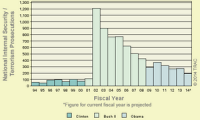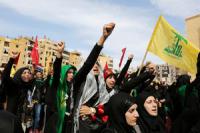-
Will terrorism continue to decline in 2019?

Lost in the headlines, rapidly accelerating news cycles and the pervasive fear generated by terrorist threats is the fact that terrorist attacks worldwide have actually been declining – in some areas substantially. From 2002 through 2014, worldwide terrorist attacks increased by 12 times and terrorist fatalities increased by more than eight times. But since 2014, the picture has changed dramatically – a development that has gone largely unreported in the media.
-
-
Experts question BioWatch’s replacement
BioWatch, the program launched more than fifteen years ago to detect bioterrorism attacks in major American cities, has been routinely criticized for not living up to its early promise. Many have suggested doing away with the system all together. Trouble is, experts say that BioDetection 21 – DHS’s proposed replacement for BioWatch – is even less effective.
-
-
Report finds that Corbyn aide, Seumas Milne, has ties to Hamas
An explosive investigative report by a British newspaper has unearthed long-standing ties between Seumas Milne, a senior aide to the Labour Party’s leader Jeremy Corbyn, and terrorist organizations committed to the destruction of Israel. The investigation also revealed Milne’s extensive ties to organizations linked to the Kremlin. Sir Richard Dearlove, who led the Secret Intelligence Service MI6 from 1999 to 2004, said: “Anyone with his sort of background could not be let anywhere near classified information. It would be out of the question. That means Corbyn could not make the judgments and decisions a PM has to make unless he stopped consulting him.”
-
-
Telegram used by ISIS to spread propaganda globally
The Counter Extremism Project (CEP) this week reports about a Telegram channel that called for lone actor terrorist attacks in London, alongside other online websites that host ISIS videos and propaganda online. The encrypted messaging app is the platform of choice for terrorist group to call for violence.
-
-
Anti-Semitism in Venezuela: Maduro regime traffics in hateful conspiracies
As the political crisis continues in Venezuela, the hardline regime of Nicolas Maduro, whose power is currently being challenged, is promoting hateful anti-Semitic conspiracy theories and allegations of Jewish or “Zionist” plots to take over the government.
-
-
Why authoritarians love the concept of the Big Conspiracy
The idea of a Shadow World Government has always been very popular among conspiracy theorists. Its manifestations might be different, but generally the concept conjures up the image of a small group of men, deciding the fate of the world behind the scenes; puppet-masters, covertly controlling the world. Rulers of the rulers.
-
-
U.K. sets to add Hezbollah to terrorist groups list

The United Kingdom will join the United States, Canada, France, and the Arab League in banning all wings of Hezbollah because of its destabilizing influence in the Middle East. Since 2008 there has been a ban on U.K citizens joining the military wing of Hezbollah. The new ban will apply to the organization’s political wing as well.
-
-
Deradicalization and countering violent extremism

Since the early 2000s, more than fifty countries have developed initiatives to counter violent extremism (CVE). Despite this, there still remains a lack of strong evidence on which interventions are effective. Researchers have reviewed the literature on CVE programs to give examples of what good CVE practice should look like.
-
-
Israel fighting Iran’s efforts to upgrade Hezbollah’s rockets

Israel has been countering Iranian efforts to use suitcases to smuggle GPS components into Syria to upgrade Hezbollah’s rocket arsenal. In 2017, once it appeared that Syrian dictator Bashar al-Assad would survive the civil war that was tearing his country apart, “Iran embarked on a grandiose plan for increasing its influence in the shattered country,” says an expert. Iran’s goal was to “build a force of up to 100,000 Shiite fighters from Pakistan, Afghanistan and Iraq. They built intelligence bases and an air force base within each Syrian airbase. And they brought civilians in order to indoctrinate them,” said Israel Defense Force’s former chief of staff, Gen. Gadi Eisenkot.
-
-
There is no national emergency on the border, Mr. President
President Trump [last week] declared a national emergency on the border to construct some portion of his promised border fence. “We’re talking about an invasion of our country with drugs, with human traffickers, with all types of criminals and gangs,” President Trump said during his remarks. Lawyers will spill much ink arguing about the legalities surrounding the law and whether President Trump can declare a national emergency. Regardless of what the law ultimately means, no reasonable person can look at the southern border and agree that it rises to the level of a national emergency.
-
-
U.S. Coast Guard officer to be charged with mass terrorism plot
Christopher Paul Hasson, a U.S. Coast Guard officer will appear in court today (Thursday), charged with plotting a massive, 2-prong attack modeled after the 2011 Anders Behring Breivik’s terrorist attack in Norway. Breivik killed eight people in Oslo as a diversion, before killing 69 teenagers in a summer camp organized by the Norwegian Social Democratic Party. Hasson compiled a hit list of liberal politicians, Supreme Court judges, and journalists – but his violent plans extended to trying to “establish a white homeland,” and using biological weapons to “kill almost every last person on Earth.”
-
-
U.S. hate groups hit record number last year amid increased violence
American hate groups had a bumper year in 2018 as a surge in black and white nationalist groups lifted their number to a new record high, the Southern Poverty Law Center said in a report issued Wednesday. The increase was driven by growth in both black and white nationalist groups, the SPLC said. The number of white nationalist groups jumped from 100 to 148, while the number of black nationalist groups — typically anti-Semitic, anti-LGBTQ and anti-white — rose from 233 to 264. Some conservative groups have accused the SPLC of unfairly labeling them as “hate groups,” and last month, the Center for Immigration Studies sued the SPLC for “falsely designating” it as a hate group in 2016, saying the SPLC has produced no evidence that the group maligns immigrants as a class.
-
-
U.S. will not take back Alabama woman who joined Islamic State
The United States claims Hoda Muthana does not have a U.S. passport, and has no right to obtain one. A lawyer for her family argued Muthana does have that right because she was born in New Jersey.
-
-
To be effective, terrorism prevention programs need strengthening
National capabilities for terrorism prevention — which refers to options other than traditional law-enforcement action to respond to the risk of individual radicalization to violence — are relatively limited, with most relying on local or non-government efforts and only a subset receiving federal support, according to a new report. to address the gaps in capability, the most effective path for the federal government would be to strengthen, broaden and sustain this local and non-governmental capacity. But such efforts will be hampered because past counterterrorism and countering-violent-extremism (CVE) efforts have significantly damaged trust in some communities.
-
-
School shooters usually show these signs of distress long before they open fire, our database shows
Our initial analysis of the school shooting data found some noteworthy patterns. All mass school shooters since 1966 had a large number of risk factors for violence. Forty-five percent had witnessed or experienced childhood trauma, 77 percent had mental health concerns, as evidenced in a prior diagnosis, previous counseling or hospitalization, or medication use, and 75 percent had an interest in past shootings, as evidenced in their writing, social media posts or other activities. The majority of mass school shooters – 87 percent – showed signs of a crisis, as exhibited in their behavior, before the shooting. Seventy-eight percent revealed their plans ahead of time, often on social media. As juveniles, they also used guns that they stole from parents, caregivers and other significant adults in their lives. Our analysis found that about 80 percent of mass school shooters were suicidal. These findings make it clearer why current strategies are inadequate.
-
More headlines
The long view
How Male Grievance Fuels Radicalization and Extremist Violence
Social extremism is evolving in reach and form. While traditional racial supremacy ideologies remain, contemporary movements are now often fueled by something more personal and emotionally resonant: male grievance.
